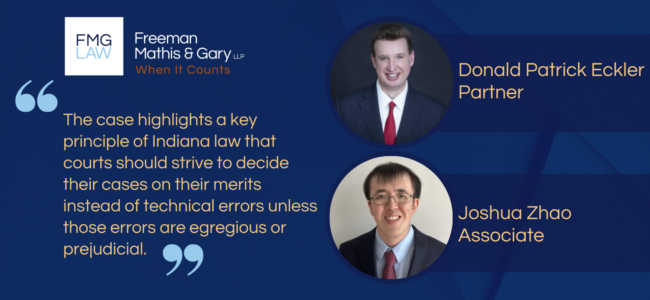BlogLine
Indiana Supreme Court holds appellant’s failure to compel record leads to discretionary dismissal
10/16/24

By: Donald Patrick Eckler and Joshua W. Zhao
In Mayberry v. American Acceptance Co., LLC, No. 24S-SC-347, the Indiana Supreme Court held that an appellant’s failure to timely compel a Notice of Completion of Clerk’s Record does not require the appeal to be dismissed under Ind. Appellate Rule 10(F). The court held that the appeal should only be dismissed for lack of good faith, where the rule violation was egregious, or where the appellee was prejudiced.
American Acceptance Co. sued Timothy Mayberry over an unpaid balance. Mayberry failed to respond and American Acceptance moved for default judgment. Mayberry later moved to set aside the default judgment, but his motion was denied. Mayberry filed a timely appeal, but the trial court clerk failed to file a Notice of Completion of Clerk’s Record as required by Ind. Appellate Rule 10(C). Mayberry failed to compel the clerk to file the notice as required by Ind. Appellate Rule 10(F) and the Indiana Court of Appeals dismissed the appeal with prejudice. Subsequently, Mayberry filed a verified motion to correct the error, but the Indiana Court of Appeals denied that motion. Mayberry petitioned for transfer to the Indiana Supreme Court which was granted.
The Indiana Supreme Court reversed, holding that the phrase in Ind. Appellate Rule 10(F) “shall subject the appeal to dismissal” gives the appellate court discretion to dismiss the appeal and the dismissal is not mandatory. The Indiana Supreme Court further held that the reasonable exercise of discretion includes accommodating the preference to decide cases on their merits rather than on technical errors. In the interest of deciding cases on their merits, the appellate court should decline to dismiss the appeal unless the failure to compel is egregious, in bad faith, or prejudices the appellee. Here, the Indiana Court of Appeals dismissed Mayberry’s appeal without finding that there was prejudice to American Acceptance, that Mayberry’s delay was egregious, or that Mayberry acted in bad faith. As a result, the Indiana Supreme Court found that the dismissal exceeded the Indiana Court of Appeals’ discretion.
The case highlights a key principle of Indiana law that courts should strive to decide their cases on their merits instead of technical errors unless those errors are egregious or prejudicial.
For more information, please contact Donald Patrick Eckler at patrick.eckler@fmglaw.com, Joshua W. Zhao at josh.zhao@fmglaw.com, or your local FMG attorney.
Share
Save Print
